December 11, 2009
Air Date: December 11, 2009
FULL SHOW
SEGMENTS
Hopenhagen?
/ Steve CurwoodView the page for this story
Denmark has dubbed its capital city Hopenhagen, as negotiators from 192 nations begin 2 weeks of talks to try to work out a new agreement to deal with climate change. UN officials say they're cautiously optimistic but problems big and small could derail a deal. Living on Earth’s Steve Curwood reports on the promises and perils amid the protests and political posturing. (12:20)
Paper Trees in Precious Ground
/ Ingrid LobetView the page for this story
Two huge plantation industries are sweeping Indonesia: palm oil and acacia trees used to make paper. But most of the land left for plantations is in peat forests -- land with the highest carbon content in the world. Plantations on peat have helped Indonesia become the world's third biggest greenhouse gas emitter in the world. Some paper companies say they're part of the solution. Some scientists disagree. Living On Earth's Ingrid Lobet reports. (18:00)
Where the Forest Ends
/ Mitra TajView the page for this story
The plantations spreading over Sumatra aren't taking up empty land. Wholesale changes in ecology that come with new plantations can affect nearby rural villages most. Living on Earth's Mitra Taj reports from Teluk Kabung, where the arrival of the pulpwood industry has devastated the cash crop of coconuts and left villagers with little hope for the future. It's not clear whether the new UN scheme to Reduce Emissions from Deforestation and Degradation – or REDD – designed to pay to preserve tropical forests will offer them a lifeline. (15:45)
Show Credits and Funders
Show Transcript
HOST: Steve Curwood
GUESTS: Jennifer Morgan
REPORTERS: Ingrid Lobet, Mitra Taj
[THEME]
CURWOOD: From Public Radio International, this is Living on Earth.
[THEME]
CURWOOD: I’m Steve Curwood at the UN Climate Convention in Copenhagen. The negotiations are heating up, but the U.S. chief negotiator remains optimistic.
STERN: We are under no illusion that this is going to be easy, it’s going to be challenging but I think and agreement is there to be had if we do this right.
CURWOOD: Report from Copenhagen on the prospects of a climate agreement. Also, our special series on saving tropical forests continues with a report from Indonesia.
SILVIUS: We can say that peat swamp forest at the moment are being logged at a much faster rate than any other forest in Indonesia – 30 to 40 percent are relatively high degraded, which is really a disaster because in peat swamp forests we find the highest carbon stores in the world.
CURWOOD: From the climate negotiations in Denmark to the forests of Indonesia -today on Living on Earth. Stick around!
ANNOUNCER: Support for Living on Earth comes from the National Science Foundation and Stonyfield Farm.
CURWOOD: From Public Radio International, this is Living on Earth. I’m Steve Curwood in Copenhagen, Denmark – or should I say – Hopenhagen. That’s the name the host country has dubbed its capital for what’s being called one of the most important meetings in the history of the planet.
ANNOUNCER: Ladies and gentlemen, honored guests – a warm welcome to Copenhagen and to the opening of the UN Climate Change conference 2009.
Hopenhagen?
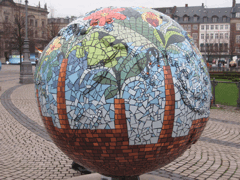
(Photo: Jennifer Stevens-Curwood)
CURWOOD: It’s taken 17 years to get here. It was in1992 when the UN first put together a treaty in Rio De Janeiro, Brazil to deal with climate change. Over the years there have been numerous meetings, perhaps the most important in Kyoto, Japan in 1997. The Kyoto Protocol put the first mandatory emission limits on rich industrialized nations. Now, as that Protocol ends its first phase, this meeting in Copenhagen has been called to extend and expand those restrictions on all nations that emit serious amounts of carbon – the developing as well as the developed countries.
DE BOER: I believe that this conference has already written history, that this conference will write history, but we need to make sure that it writes the right history.
CURWOOD: That’s Yvo de Boer, executive secretary of the UN Framework Convention on Climate Change. He’s in charge of the process, and in his message to the 192 nations that have gathered here in Copenhagen, he’s not asking for anything fancy for Christmas.

(Photo: Jennifer Stevens-Curwood)
DE BOER: What I would advocate for this conference, in spite of all of the attention is keep it simple. Focus on an outcome that can deliver immediate action on the ground the day this conference ends, and what I want to see at the end of this conference is a list of rich country targets, that are ambitious, clarity on what major developing countries will do to limit the growth of their emissions, and a list of financial pledges that will make it possible for the much broader developing nation community both to change the direction of their economic growth and adapt to the inevitable impacts of climate change. That’s what I’m asking Father Christmas for.
CURWOOD: Yvo de Boer is a patient, soft spoken, plain speaking diplomat, but with time running out he used atypically blunt words to remind nations of promises they’d made to strike a deal in Copenhagen.
DE BOER: And the negotiators in the week that they have, had better make damn sure that they deliver.
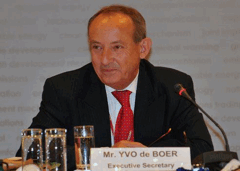
U.N. Climate Chief, Yvo DeBoer (Courtesy of the United Nations Climate Change Conference)
CURWOOD: But so far that’s uncertain. There are stumbling blocks big and small.
The largest has to do with the biggest carbon polluters: the United States and China, which between them produce half the world’s climate changing gases. The U.S. has historically been an untrustworthy party to the negotiations. In 1997, it signed the Kyoto Protocol, which required steep cut in U.S. emissions. But the U.S. never ratified the deal, nor made the cuts it had agreed to. It did ratify the 1993 Rio Climate Convention, but never honored those commitments either. But now, the Obama administration says those days are over, and it’s been sending a steady stream of cabinet level officials to make its case.
[SOUNDS OF MILLING PRESS CROWD]
CURWOOD: It was standing room only when the U.S. EPA Administrator Lisa Jackson appeared at the climate talks in Copenhagen shortly after announcing the EPA would use the Clean Air Act to limit greenhouse gases, a move designed to spur Congress to act.
JACKSON: At a moment when urgent economic and environmental issues are pressing on us from all sides, President Obama has positioned the U.S. to lead the way. We are seeking robust engagement with all of our partners around the world; we are seeking to support sustainable economic opportunities in developed and developing nations; we are seeking a path forward that rewards our mutual interests and recognizes our individual responsibilities, and we are seeking to prevent the rapid approach of climate change that affects us not as separate nations but as one earth.
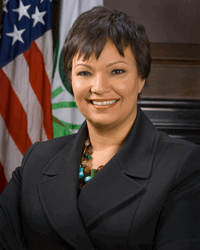
Lisa Jackson is Administrator of the Environmental Protection Agency (Photo: Courtesy of EPA)
[SOUNDS OF MILLING CROWD]
CURWOOD: But making that a reality is going to be tough. For the United States that job falls to Todd Stern, President Obama’s chief climate negotiator.
STERN: Look the bottom line here is – the United States is committed to getting the strongest possible agreement we can over the next two weeks. We are under no illusion that this is going to be easy, it’s going to be challenging but I think and agreement is there to be had if we do this right.
CURWOOD: The biggest challenge comes from China. It wants the U.S. to honor its earlier commitments in Rio and Kyoto and most recently in Bali and fulfill its legal obligations to cut emissions. Asked by reporters about that, Todd Stern was, well, stern.
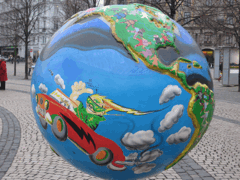
(Photo: Jennifer Stevens-Curwood)
STERN: We're not going to become part of the Kyoto protocol so that’s not on the table. We're not going to do Kyoto and we're not going to do something that’s Kyoto with another name.
CURWOOD: That’s because to be in compliance with Kyoto the U.S. would have had to make deep emissions cuts, which it hasn’t – Kyoto rules call for stiff penalties for nations that miss their targets. Now the United States wants to start anew, with a legally binding Copenhagen protocol that for first time also includes limits for China.
STERN: Right now, China is the biggest emitter in the world; by 2020, it’s going to be 60 percent larger than the United States. By 2030, it’s going to be 80 percent larger than the United States. You can't even think about controlling this problem without having significant action by China. So our emissions are pretty much flattening out right now and then they're going to go down. China – and I’m not being critical – China has an extraordinary successful economy and is in a different stage of development than we are, but emissions are emissions. You just got to do the math. This isn’t a matter of politics or morality or anything else, it’s just math. And you cannot get to the kind of reductions that we need globally if China’s not a major player, it's just the reality.
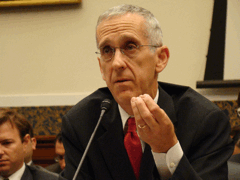
Todd Stern is the climate change envoy for the United States (Photo: Courtesy of the US House of Representatives)
CURWOOD: China’s reaction was swift and even sterner. It’s the United States that should do the math says a senior China delegate – U.S. emissions are up 17 percent since Kyoto. And he says a legally binding agreement is already available – it’s called the Kyoto Protocol, and when it begins its next commitment period, China says it will start slowing it growth of emissions. Su Wei is China’s chief negotiator in Copenhagen.
[WEI SPEAKING CHINESE]
VOICEOVER: I think all the parties should show sincerity in the protection of climate and they should be courageous enough to face up to their historical responsibilities. To solve the issue of climate change we cannot just discuss or talk we need to take concrete actions and make efforts; we need to translate our words into practice and deeds. I think both the UNFCC and its Kyoto protocol are legally binding documents.
[CROWD CHANTING; CLAPPING SOUNDS]
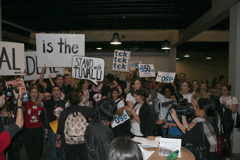
Small island nations like Tuvalu will disappear if melting glaciers cause predicted sea-level rise.(Photo: Bruce Gellerman)
CURWOOD: But it just wasn’t the world’s largest climate polluters that were heating up the climate talks here in Copenhagen. It was demonstrators protesting on behalf of one of the smallest countries, the ten square mile, Pacific island nation of Tuvalu, which would vanish in predicted sea level rises. Protestors blocked the halls of the convention center and demanded acceptance of Tuvalu’s proposal that would force both the United States and China to make even deeper emission cuts. The proposal was widely supported by many African nations, and threatened to derail the negotiations. But China, India, and Saudi Arabia moved to block it.
CURWOOD: Jennifer Morgan of the World Resources Institute has been watching climate talks since the earliest days. She says Copenhagen is different.
MORGAN: It’s just that the stakes are so much higher this time. I mean we have over a hundred heads of state coming to talk about climate change next week and seal the deal. We’ve never had that before. We’ve had heads of state on the phone in Kyoto, but we’ve never had them here. And that changes it.
CURWOOD: So, how excited are you?
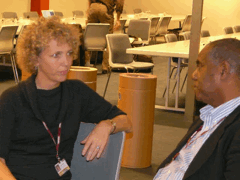
Steve Curwood talks with Jennifer Morgan (Photo: Bruce Gellerman)
MORGAN: Oh, I’m incredibly excited to be here because it’s been – you know, Copenhagen for those of us working in this field it’s kind of been – it’s like a verb, a noun, an adjective in your daily life, right? So, I’m excited that we’re here. I’m excited that there is a lot of world attention to this, and gosh, I hope that we make it worth it.
CURWOOD: So, the stakes are high. What are the super-high stakes you’re talking about?
MORGAN: Well, I think the fundamental question is whether this meeting sends a signal to the world that the major economies of the world, particularly the developed countries are serious about moving to a low-carbon economy in a binding fashion and whether the major emerging economies are also serious about taking action to move to a low carbon economy. If we don’t get that signal out of here, I don’t know when we’re going to get it. And I think that you’re seeing the high stakes also because of the island countries and Africa who are feeling panicked – that if we don’t get something moving here that window that scientists tell us is very small to avoid dangerous tipping points is closing.
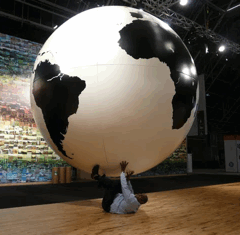
The gravity of global climate change weighs heavily on Living On Earth’s Steve Curwood.
CURWOOD: The level – the public level of criticism between China and the United States is pretty high, not terribly diplomatic sounding at this gathering. What does this tell us?
MORGAN: This tells us that these are the two main deal-maker or deal-breakers in this game, and that they are both concerned about being blamed at the end of the day for any failure that might occur here, and are already setting themselves up. That’s one thing. It also tells us that what the United States does has a lot to do with what China does and what China does has a lot to do with what the United States does, and that there is a poker game going on here – both on the level of ambition and the level on bindingness around this deal.
CURWOOD: Poker game – who’s got the cards, what are they, how can they play them?
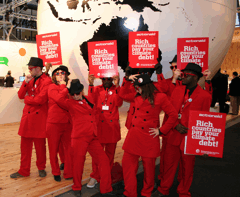
REDD protestors (Photo: Bruce Gellerman)
MORGAN: Well this is a new world that we’re in, because I think in the past the United States has held a lot of cards. For example, when China wanted to join the WTO, but now China holds a lot of the cards. China is taking significant action to reduce its emissions – it is far ahead of the United States on renewable energy laws, on fuel economy standards, on many of these items, and the U.S. needs things from China, but the U.S. doesn’t yet have a lot to give. It has a provisional target that’s not through the Senate yet, so they’re nerv – they want to put that out. It can’t put out real long-term finance because it’s not through the Congress yet. China’s looking for finance not for itself but for the most vulnerable developing countries, so I think China holds a number of cards in some ways more than the U.S. holds right now.
CURWOOD: Talk to me a bit about the demonstrations and the street theatre that’s going on here. Now, there’s always a bit of street theatre, but I saw the cops come for one of these demonstrations – seems like it’s more intense.
MORGAN: The amount of public engagement before this conference and in this conference is unprecedented. Coming into this meeting there were numerous days of action around the world, in capitals occurring. And now you see here, especially a very strong young delegation – this is their future that’s being negotiated, and so I think it will hold politicians much more accountable, hopefully, than it has in the past.
CURWOOD: Jennifer Morgan is the climate energy policy director at the World Resources Institute. Thank you so much.
MORGAN: Thank you.
Related links:
- To Hear Lisa Jackson's Speech in Copenhagen Click Here
- To Hear Todd Stern's Speech in Copenhagen Click Here
- The United Nations Climate Change Conference
- Union of Concerned Scientists' Alden Meyer comments on the conference progress Dec. 12th
[MUSIC: Echo And The Bunnymen “Supermellow Man” from ‘B Sides And Live 2001 – 2005’ (Cooking Vinyl - 2007)]
Paper Trees in Precious Ground
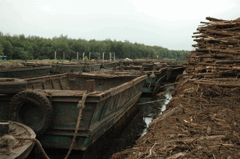
Paper and palm oil companies, and villagers too, carve canals into soggy peat for drainage and transportation—releasing stores of carbon dioxide into the atmosphere.
CURWOOD: We’ll have more from Copenhagen when the climate talks conclude next week, and stay with us – our special series on global warming and tropical forests continues with a journey to the vanishing peatlands of Sumatra. Keep listening to Living on Earth!
[SOUNDS OF MILLING CROWD]
CURWOOD: It’s Living on Earth, I’m Steve Curwood at the climate negotiations in Copenhagen, Denmark. Back when the Kyoto Protocol was first put together in 1997, UN climate negotiators were not able to decide how to handle land use changes and their effects on climate. But as greenhouse gas emissions have continued to rise, a big part of it has been the loss and degradation of tropical forests. This time negotiators are determined to get a deal to limit emissions from land use change. And incentives to protect tropical forests are at the top of the list.
Living on Earth’s Ingrid Lobet and Mitra Taj went to Indonesia, where the clearing and burning of forests and the draining of carbon-rich peatlands make it the third biggest emitter of global warming gases, behind, only China and the United States. They're reporting on the obstacles and opportunities for what climate negotiators call REDD – that is the Reduction of Emissions from Deforestation and Degradation. We begin our series from Indonesia with Ingrid Lobet on the island of Sumatra.
[TRAFFIC SOUNDS; MUSIC PLAYING SOFTLY ON CAR RADIO; SOUND OF CAR ACCELERATING]
LOBET: To see what drives the Indonesian economy, just get out on the road. Even before sunrise you see truck after truck, loaded with orange palm fruits. Palm oil is big business around the world – for cooking oil, detergent and fuel. And there are still more trucks, laden with logs, to make paper. Soon our car stops so Arman, the driver, can have a smoke.
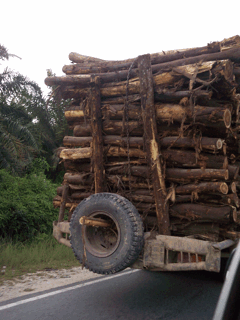
A truck carrying trees to be turned into paper.
[BIRDS SINGING; OUTDOOR SOUNDS; GIBBON IN THE BACKGROUND]
LOBET: Where we've stopped the forest is burnt away, most likely to make way for oil palm trees. In a distant stand of forest we hear gibbons. As he smokes, Arman says used to hunt them, but not anymore.
[ARMAN SPEAKING INDONESIAN]
VOICEOVER: In the forest, I came across one of these animals. I shot it four times and it fell out of the tree and leaned against it crying. It was holding a baby. It cried like a human, there were tears and it sniffed. She handed her baby to me, then sank down and died. That's when I stopped shooting animals that act like humans.
LOBET: The sound comes from way in the distance. As the trees are cut the animals are being pushed further out.
[ARMAN SPEAKING INDONESIAN]
VOICEOVER: They don’t know where to find food anymore.
LOBET: The disappearance of the forests here in Riau has been so swift. It's well documented by the environmental group WWF. But Jonotoro, who's worked here in Riau for the Forestry Ministry for 13 years, put it best:
[JONOTORO SPEAKING INDONESIAN]
VOICEOVER: Back in 1996, the forest here was still good. But after 1998, after the end of the Suharto era, it was a free for all; people just cut the forest as they pleased. There was no law enforcement. Now there’s only 20 to 30 percent of the forest left here in Riau province. That is mostly in the national parks, and even the forest there is degraded.
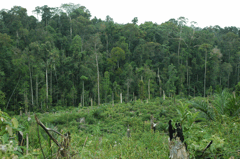
According to WWF, at least seventy percent of Riau’s forests have been cleared.
LOBET: Much of the vanished forest has given way to oil palm and to trees for paper.
The voracious hunger for copier paper and for paper packaging, most recently in Asia, is bringing money, and foreigners to giant new paper mills in once quiet outposts.
KERR: My name is Dave Kerr, and I work for APRIL in Kerinci, Indonesia.
LOBET: APRIL or Asia Pacific Resources Limited is one of the largest pulp and paper companies in the world. And David Kerr, a boat building hobbyist who once worked in paper in eastern Canada, now directs operations here at this mill, really a small town in itself.
KERR: It’s gonna be really loud here!
REPORTER: What is this?
KERR: This is a chipping operation, you’ll see the logs going into the chipper, and disappearing!
[LOUD SOUND OF LOGS BEING CHIPPED, THEN MACHINE DIES DOWN]
KERR: Each chipper can take three or four thousand tons per day.
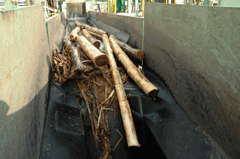
Acacia trees grown for paper are ground into chips.
[CHIPPER CHIPPING]
LOBET: Seven chipping lines swallow acacia trunks whole, and in seconds spit out thumb-sized chips of wood.
[CHIPPING MACHINE STOPS AND HUMS]
KERR: So after this the chips go to the digesters where it’s cooked, and turned into pulp.
LOBET: Pulp is the raw ingredient for paper; something the world can’t seem to get enough of. APRIL's Kerinci complex produced 800 thousand tons this year.
[VOICES AND FACTORY SOUND]
KERR: We’re about to enter Riau Paper. This is the press section and the forming area.
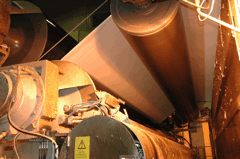
Making paper.
LOBET: Inside, the wet paper is squeezed between giant rollers, then dried, starched, and at nearly a mile a minute, crisp white paper spins onto enormous spools that each weigh more than twenty pickup trucks.
[FACTORY SOUNDS]
LOBET: The process is so fast it’s dizzying, and so loud and hot, APRIL employees monitor progress from an air-conditioned control room. They’re looking for tears, or breaks in the giant sheets.
KERR: A good day one or two breaks per day – a bad day, sometimes as much as ten.
LOBET: Does it run 24-seven?
KERR: 24-seven, 365. The only time we stop is for maintenance and that's usually measured in hours up to 12.
[SOUND OF PAPER CUTTER; STRAPPING MACHINE]
LOBET: The sheets are cut and stacked, then it's on to a printer or copier, maybe near you. But this hunger for paper and palm oil, and the forest felling that goes with it, is overwhelming even Indonesia's vast forests. So as the country pursues development, and the plantations expand, they are spreading over a very special landscape – tropical peat land.
[SOUND OF WALKING OVER DRY ORGANIC GROUND COVER]
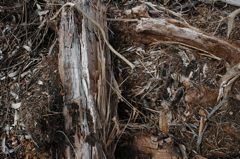
When peat forest is drained and cleared, the undecomposed plant matter in its soil is revealed.
LOBET: And the ground is a mix of acacia branches, bark, and tree material that is part of this dark brown and black peat soil. This open field was once a tropical peat land forest, a landscape unfamiliar to most Americans. Intact, it was soupy or spongy, hard to walk through. Peat forms when the water table is at ground level – or even higher. Submerged, without air, plant material doesn't decompose; it just gets compacted – into a treasure trove of stored carbon. Left alone for millions of years, it would turn into coal. But if you drain away the water by cutting canals or ditches, tropical peat lands dry out and their vast carbon stores escape into the atmosphere.
[DRY WALKING SOUND]
LOBET: In this field, a crop of pulpwood trees has just been harvested, and a new one is being planted.
BATHGATE: My name is John Bathgate. I’m a forester with a PhD in forestry. My title at the moment is plantation best practices manager.
LOBET: Bathgate is an outdoorsy New Zealander who spent ten months living in the forest among illegal tree cutters. Indonesia has vast peatlands. This island alone, Sumatra, stores more carbon in peat than is emitted globally by human activities in a year. Now much of the peat, like what we're walking on, is drained and emitting carbon at a furious rate. Many environmentalists blame plantations like this one. But, Bathgate says his company is not to blame.
BATHGATE: Just over here where these bigger trees are there is a small river. This river has been used probably for centuries or longer by local people, for fishing and hunting and gathering, and more recently for taking out timber for sale. So this land here has had quite a history of degradation and what we would call abuse – or at least not professional, high-tech development.
LOBET: When APRIL planted its first crop of pulp trees on this land he says, it was already barren. Villagers, he says, had already hacked canals into the swamp, both to float out trees they cut, and to plant crops.
BATHGATE: If, before APRIL came, this was virgin forest with the water table at the surface, then yes, we’ve got a lot to answer for. But it was like this over here. It was already – had quite a lot of illegal logging, small drains through here.
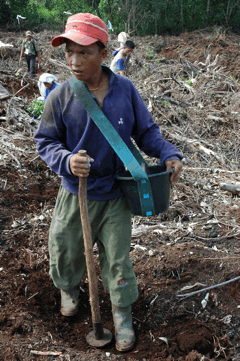
Just weeks after clearing a crop of acacia trees for paper, workers plant new seedlings.
LOBET: Today contract workers wielding heavy tampers pound the ground into flat spaces for new seedlings. I lean down close to capture the sound as the tool hits the ground, but there is virtually none; the peat absorbs it.
[FAINT SOUND OF TAMPER HITTING PEAT]
LOBET: The peat is spongy; it gives by two or three inches every time this man puts his foot down.
[SOUND OF POUNDING]
LOBET: These workers are planting seedlings of acacia, the species favored by this industry. That's because acacia grows fast – an inch a day. It sounds incredible, but in this climate, John Bathgate says these trees can be harvested for paper in just five years.
BATHGATE: So it's absolutely fantastic growth. Coupled that with that there’s high rainfall here – nearly 3,000 millimeters a year – and the fact that peat is like a big sponge absorbing and holding the moisture. So moisture for growth is available all year round. As well as that, it’s a very fine fiber for growing very soft, high quality writing paper.
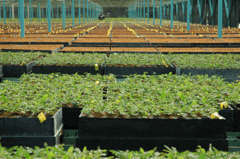
APRIL’s Pelalawan nursery ships out 150,000 seedlings per day.
[MECHANICAL SOUND OF CRANE]
LOBET: On a big bare spot in this sea of paper trees, the giant claw of a Hitachi excavator grabs skinny logs out of a metal boat.
[CRANE SOUND CONTINUES]
LOBET: The cut logs floated in from the far reaches of the plantation on a canal, one of hundreds the industry carves into the peat. These canals cause carbon release, but in what's becoming a high stakes game of competing carbon claims, Bathgate says APRIL's acacia plantations actually reduce carbon emissions overall.
BATHGATE: Absolutely. What we're saying for the peat lands: we turn it from a large emitter to a less large emitter. There will still be some net emissions. On peatland, on average, we are reducing the emissions by something in the order of 50 percent.
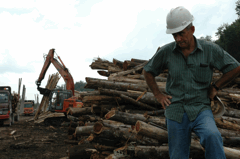
Forester John Bathgate with acacia logs barged by canal from elsewhere on the plantation. Next they'll be trucked to the mill.
LOBET: The company claims it cuts emissions by preventing fire and by setting aside 35 percent of its concessions, where forest is allowed to grow back with the water level high.
In Bathgate's view, the paper business is less harmful than the death by a thousand cuts of poor people, felling and burning the forest to plant their rice and rubber trees.
BATHGATE: I'm absolutely 100 percent convinced that leaving it to continue to degrade and leaving it for other parties to continue to degrade – it could get worse.
LOBET: But many peatland experts don't share this benign view of the plantations spreading across Indonesia. Marcel Silvius is a tropical soils expert in the Netherlands. He's lived in Indonesia, speaks the language, and was among the first scientists to point out peat's importance for carbon storage.
SILVIUS: A lot of the peat swamp forests in Indonesia are degraded. I would say about 90 percent of the peat swamp forests are degraded at the moment in Indonesian – in western Indonesia. But that doesn't mean you then have a license to go on with and even to increase the degradation by putting plantations in place of the remaining natural forest.
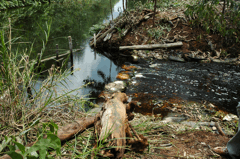
A manmade canal and dam. Water levels in acacia plantations must be carefully controlled to maximize yield.
SILVIUS: Peat is a soil that is consisting of organic carbon that is accumulated by the falling of leaves and decay of roots and tree trunks over thousands of years because of the waterlogged situation. And that carbon will only remain in the soil when the water levels in the area remain high. And what plantations do is they actually take the water out. And when you remove the water, the carbon will go up in the air. Because the soil carbon will react with oxygen of the air and becomes carbon dioxide, a greenhouse gas, so it warms up the earth.
LOBET: Silvius' organization, Wetlands International, estimates that in the 1990s alone, Sumatra lost 18 percent of the carbon in its soil. And when, after years, peatlands have finally given off their carbon, the damage isn't over.
SILVIUS: When the water is drained out of the peat, the soil will subside; it will become lower and lower. And then you get increased floods. And in the coastal peat swamps of Indonesia, you can get saltwater intrusion, which means that, in effect, you will render an area totally unproductive after perhaps a period of 30 to 50 years.
LOBET: In place of plantations, Silvius offers a different prescription for damaged peatlands: restore them. And that takes us to perhaps Indonesia's ground zero for forest carbon and the international money that could help keep it in the ground: a giant lowland peat storehouse known as the Kampar peninsula.
[SOUND OF GENERATOR; HAMMERING ON WOOD]
LOBET: Recently the group Greenpeace constructed a "Climate Defenders Camp," complete with kitchens, solar electricity and bunks for volunteers on one corner of this forested stretch, in hope of attracting world attention.
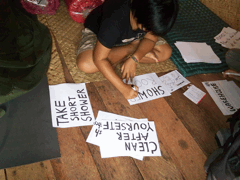
Greenpeace activists set up camp.
[SOUND OF SAWING]
LOBET: People from the villages nearby filled a new outdoor meeting room for the opening of the activist camp.
YASHWANT: [OVER P.A. SYSTEM] At a very critical time, all of us are sitting in a very important place.
[WOMAN TRANSLATES INTO INDONESIAN OVER P.A.]
YASHWANT: Protection of Kampar peninsula is not only important for the people who live around here or for the biodiversity, but it is also important to stabilize global climate.
[WOMAN TRANSLATES INTO INDONESIAN OVER P.A.]
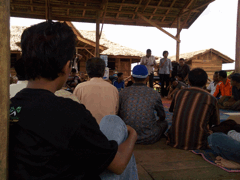
LOBET: This peat-rich peninsula perfectly illustrates the maneuvering taking place in forested parts of the globe, as players try to guarantee that global investments in forest carbon flow to them. Kampar consists of one giant dome of sodden peat. It's a rainwater-driven landscape with ground and belowground flows from the center to the periphery, into the ocean. APRIL's John Bathgate says plantations on the periphery can protect those all-important deep carbon stores in the middle.
BATHGATE: So we are one of the players that have done quite a lot of the work at looking at the value of the core and how the core could be fully protected, because that needs to happen.
LOBET: APRIL calculates plantations will reduce emissions in the periphery, or what it calls the Kampar Ring, and it hopes to market credits for that saved carbon directly to international investors.
BATHGATE: The figure we come up with is about – is a reduction of about two point six million tons of CO2 per hectare per year. At a conservative value of ten dollars – that is 26 million dollars a year to actually then be fed back into protecting the core of the Kampar peninsula, which is where the really large carbon is, and providing benefits for stakeholders. It's not just our carbon, I mean the carbon belongs to the people of Indonesia – the Ministry of Forestry of Indonesia has a stake, local communities have stake.
LOBET: But peat expert Marcel Silvius has a different idea that he says would raise more money: let the government sell carbon credits through the emerging UN forest finance system, and with the proceeds employ local people in ecology – blocking up the old illegal logging canals and restoring Kampar's damaged outer periphery.
SILVIUS: Why not just immediately restore the hydrology of the area and with that stop the soil emissions, and then plant indigenous tree species, which do not require drainage? And actually you can make a lot of money on it. From an area like Kampar it is easy to get something like 30 to 50 million dollars per year in carbon credit benefits. So we are really looking at a new and massive opportunity for conservation.
LOBET: In order to make this plan work for Kampar, the Indonesian government would need to be on board. That's part of why Greenpeace opened its camp. But after activists chained themselves to an APRIL excavator recently, many of the foreign activists were deported. Still Greenpeace workers like Bustar Maitar managed to get out the message to the newly re-elected Indonesian president, Susilo Bambang Yudhoyono, known here as SBY.
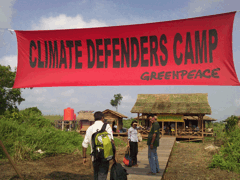
Related links:
- Recent Scientific Paper on Peat Emissions
- Asia Pacific Resources International Limited
- Peat Experts Wetlands International
- Environmental Collaborative Group in Riau Eyes on the Forest
- Asia Pulp and Paper
- Greenpeace Southeast Asia
[MUSIC: Michael Conn, Ian Ritchie & The West India Company “Indonesia” from ‘Globe Trekker Ambient Journey’s’ (Pilot Film & TV Productions - 2006)]
CURWOOD: Kampar is not the only deep peat land in Indonesia. Next our team heads further south in Kerumutan, where REDD may hold promise of more sustainable development for people on the edges of survival. That’s just ahead on Living on Earth – stay tuned.
ANNOUNCER: Support for the environmental health desk at Living On Earth comes from the Cedar Tree Foundation. Support also comes from the Richard and Rhoda Goldman fund for coverage of population and the environment. And from Gilman Ordway for coverage of conservation and environmental change. This is Living On Earth on PRI, Public Radio International.
Where the Forest Ends
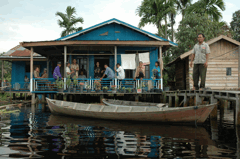
The home of Teluk Kabung resident Maharum bin Ibrahim.
CURWOOD: It's Living on Earth, I'm Steve Curwood. Many poor rural villagers in Indonesia have never heard of REDD – the UN scheme to Reduce Emissions from Deforestation and Degradation. Yet their livelihoods depend almost entirely on the land or the forest. Living on Earth’s Mitra Taj visited a village in Riau province on the island of Sumatra – and has our report.
[MOTORCYCLE SOUND COMES UP AND UNDER]
TAJ: There’s no road that leads to Teluk Kabung. Getting there means spending half a day in a boat – or three hours on the back of a motorcycle along a rough track.
[SOUND OF MOTORCYCLE HITTING BUMP; DRIVER SAYS, “OOOOO”]
TAJ: Three and a half hours – if it rained the night before.
[DRIVER SPEAKING INDONESIAN: “HUJAN HUJAN, AIR, BAHSA!”]
TAJ: Yus, the motorcycle driver, explains the messy ride in simple words: rain, water, wet!
[MOTORCYCLE ACCELERATES; DRIVER SPEAKING INDONESIAN: “GAMBUT”]
TAJ: “Gambut,” he adds – Indonesian for “peat.” Though it looks like a typical muddy path, what's under the wheels is actually carbon-rich peatland. A good part of peat is already water. Add a night’s rainfall to it, and driving on gambut is like driving on “gado-gado,” a popular Indonesian dish of vegetables covered in peanut sauce.
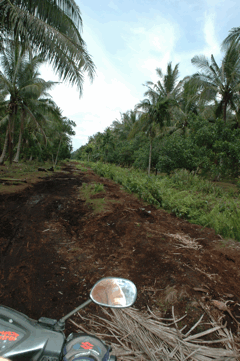
The muddy path into the village of Teluk Kabung.
[BRAKING AND TAKING OFF SOUND]
TAJ: Far from Jakarta, far from even the Riau provincial capital of Pekan Baru, and farther still from the corporate headquarters of pulpwood and oil palm companies; villagers from Teluk Kabung have a hard time getting their concerns heard.
[SQUEAKY SHELLING SOUND]
TAJ: And their biggest concerns have to do with coconuts.
[SHELLING SOUND; YUS SPEAKING INDONESIAN]
VOICEOVER: In our village language this is coconut shelling.
[SHELLING SOUND, BOYS LAUGHING]
TAJ: Teenage boys take whole coconuts – as big as bowling balls – and heave them down onto machetes fixed to poles.
[SHELLING SOUND CONTINUES]
TAJ: After prying out the hairy brown center – the familiar coconut found in supermarkets – they toss aside the husks into piles. Villagers crush the white coconut flesh for oil, which they sell to dealers, who sell it to dealers, who sell it to an oil company.
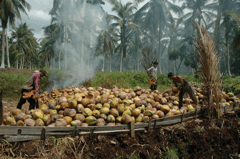
Shelling coconuts.
[WALKING SOUNDS]
TAJ: Coconuts are everywhere in Teluk Kabung. The discarded shells – pressed into the peat – literally pave the narrow footpaths into the village.
[WALKING SOUNDS; RUSTLING]
TAJ: But a few years ago, things changed – the forest surrounding Teluk Kabung’s coconut groves vanished. How much of it?
[VILLAGE MEN SPEAKING INDONESIAN]
VOICEOVER: Oh a lot! Thousands of hectares!
[VILLAGE MAN SPEAKING INDONESIAN]
VOICEOVER: When I was small, everything back there was untouched forest.
[VILLAGE MAN 2 SPEAKING INDONESIAN]
VOICEOVER: As soon as they cut down the trees in the forest, the pests swarmed in, and ate our coconut trees.
TAJ: The villagers blame an acacia supplier for Asia Pulp and Paper, or APP. Together with the multinational paper giant APRIL, APP controls about a quarter of the remaining natural forest in Riau province.
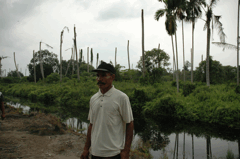
Manata and his devastated coconut grove.
[WALKING ON DRY GROUND]
TAJ: Villagers say when the forest was replaced with pulpwood plantations forest insects began thriving on their cash crop.
[WALKING SOUND; A MAN COUGHS]
TAJ: Manata is tall and strong, and leads the way to the communal coconut farm he manages just off the river.
[MANATA SPEAKING INDONESIAN]
VOICEOVER: These are our problems; this is the problem here.
TAJ: The landscape is surreal – dozens of coconut trees lie dried up on the ground. And half of those towering above have nothing on top – no palm fronds, no fruits. Just tilting trunks.
TAJ: Can we see any of the pests here?
[RUSTLING SOUND; MANATA SPEAKING INDONESIAN]
MANATA: Here’s one.
[GASP]
TAJ: Manata pulls a big black beetle from the leaves of a fallen tree – already being devoured by red ants.
[FAINT SOUND OF BOAT MOTOR; FOREST ANIMALS]
TAJ: In Indonesian peatlands, making money usually starts with draining the water out of peat. And not just for big pulpwood and oil palm plantations.
[WATER SPLASHING]
TAJ: Manata says without the drainage canal he dug here at the edge of his plantation, coconuts – or any other crop – won’t grow.
[MANATA SPEAKING INDONESIAN]
VOICEOVER: First we dug the canals, then we cleared the forest – we cut down the trees and burned everything – then we planted the coconut trees, pulling up the weeds every three months, and after seven years they were finally ready to harvest. And in 2007 we lost everything.
TAJ: Without much coconut oil to sell, there’s hunger here. Villagers can only afford to buy a tenth of the rice they used to.
[MANATA SPEAKING INDONESIAN]
VOICEOVER: It makes me want to cry the only reason I’m not crying is because I’m holding back. We have nothing else. Sometimes I can’t even look at this land, because I have no hope. I can’t compare what it’s like seeing this to anything else.
[WATER SPLASHING; BOAT STARTS UP, TAKES OFF]
TAJ: Manata steers a wooden outboard down his canal toward Gaung River, cutting through water brown from the tannins in the peat.
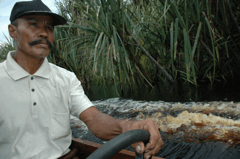
Manata steers a boat through brown, peaty water.
[BOAT MOTOR FADES; PEOPLE IN BACKGROUND SHOUTING]
TAJ: Tonight the canal leaders gather at Maharum bin Ibrahim’s house. He’s the leader of the canal leaders.
[CUTTING AND SPILLING SOUND]
TAJ: Yus, the motorcycle driver, splits young coconuts with a machete.
[GLASSES SET ON FLOOR; POURING SOUND]
TAJ: And pours a round of fresh coconut water, as Maharum begins the discussion.
[POURING SOUND; MAHARUM SPEAKING INDONESIAN]
VOICEOVER: We’re having this meeting right now to try to find a solution from the government or from the company. We've sent letters to parliament, the regent, the governor, but we haven't had any response.
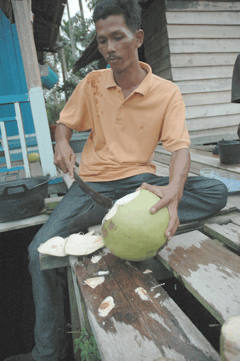
Yus prepares a round of coconut water.
TAJ: Maharum says villagers want compensation for the dead trees, and help buying pesticides to stop the plague. And they have an even longer-term worry.
[MANATA SPEAKING INDONESIAN]
VOICEOVER: We have no land left for the next generation. The land has been taken by the company. None of it is owned by the community anymore.
TAJ: In Indonesia, the size of a village’s farmland is only limited by how much work its members can put into clearing new forest to plant crops. But hard work isn’t a land title. And every year the Forestry Ministry leases out huge tracts of land to forest industries – land that might include villages, millions of tons of carbon, or habitat for endangered species. And it’s up to the companies that win the concessions to balance their own interests with everything else. Out here, threats to the environment and biodiversity translate into threats to people’s survival.
[MAHARUM SPEAKING INDONESIAN]
VOICEOVER: Ever since the company came in and cut down the trees, more and more people have been hearing the tiger, lurking in the village.
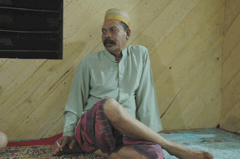
Maharum leads a discussion in his house.
[SUPARMI SPEAKING INDONESIAN]
VOICEOVER: Here it’s very hard to find a job near your home – it’s impossible, you have to find a job somewhere else.
TAJ: 25-year-old Suparmi shares his story of being attacked by a tiger just last March:
[SUPARMI SPEAKING INDONESIAN]
VOICEOVER: Once my friends offered my brother and I some work in the forest, cutting down trees and making wood boards out of them. We were there working two weeks, and one night – we didn’t know what was going on – all of a sudden my brother was screaming. It seems he had been dragged by the foot and some of his toes were missing. I stepped outside to look around with a flashlight, and the next thing I knew it had attacked the back of my head. My friend was pulling my feet and the tiger was pulling my head and the next thing I remember were people wrapping my head with cloth.
We all left – while we were in the boat we could sense the tiger following us, walking along the riverbank. For months, my brother and I couldn't even leave the house, not even to go to the toilet. We felt like it was after us.
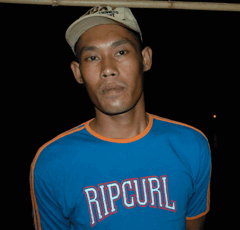
Suparmi was attacked by a Sumatran tiger at a logging camp in the forest.
Plus, people in the village kept saying they heard weird sounds at night – tiger sounds. The way I see it, the attack – it’s just a tragedy. We don’t understand it; we just accept it. Maybe it was a punishment from God for doing something bad.
[IMAM SINGS MORNING CALL TO PRAYER]
TAJ: Just before dawn, the village imam, Yamin, calls the faithful to prayer from the small wooden mosque by the river.
[IMAM CONTINUES TO SING PRAYER]
TAJ: A handful of Teluk Kabung worshippers find their way through the mud and darkness with small flashlights.
[WATER SOUND]
TAJ: They perform “wudu,” or ritual washing at a small pool in front of the mosque. After the morning prayer, Yamin reflects on the changes taking place in his village:
[IMAM SPEAKING INDONESIAN]
VOICEOVER: Destiny is like a wheel, it turns and sometimes that means we’re on top, sometimes we’re on the bottom, sometimes we’re happy, sometimes we’re sad. We must take it all as God’s will.
TAJ: If the fortunes of Teluk Kabung do turn around, it might be another palm tree that leads to better times.
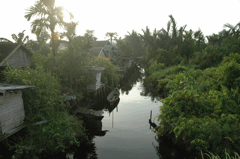
The sun rises over Teluk Kabung
[BIRD SINGS]
TAJ: The villagers have never heard of any proposal to make a living by not exploiting the land. But they say they welcome anything that will give them a say in their future.
[ROOSTER CALLS; CRICKETS CHIRP; MEN CHANTING PRAYER; MOTORBOAT PASSES IN THE DISTANCE]
CURWOOD: That was Living on Earth’s Mitra Taj reporting from the village of Teluk Kabung, in Riau province, Indonesia. The villagers asked Mitra to see if the company APP could help them. That's the paper company whose business partner cut the trees nearby. So, team member, Ingrid Lobet, went to visit the APP offices in Jakarta.
[CARS PASSING, HONKING, BRAKING]
LOBET: Jakarta is the Indonesian capital and center of power. With its choking traffic, is a long way from the rural life of Teluk Kabung.
GREENBURY: My name is Aida Greenbury. I’m the director of sustainability and stakeholder engagement of Asia Pulp and Paper in Indonesia. Yes of course, we are always interested to help the community who live in our operation and surrounding our operations.
LOBET: Aida Greenbury said insects sometimes do attack after forests are cut.
GREENBURY: We are facing the similar situation with other pest and disease in pulpwood plantations. It is true. That's why we always make sure we have a natural forest corridors. Because natural forest corridors, in addition to providing habitat for the flora and fauna, it’s also actually stop the pest and disease outbreaks, including beetles. So I agree with you; it is one of the risks of development of plantations.
LOBET: And the villagers’ concern about not having enough forest for the future is not unique to Teluk Kabung either. Almost everywhere you go in Indonesia, you hear stories of officials giving out licenses for plantations in forests that local people consider theirs. Authorities also grant licenses on deep peat lands, even though by presidential decree, that's forbidden. At Forest Ministry headquarters in Jakarta, a stuffed tiger poses fiercely in one corner of the office of Daruri. He's director general for forest protection. Daruri says he and his colleagues haven't thought much about peat, because plantations mean revenue and jobs.
[DARURI SPEAKING INDONESIAN]
VOICEOVER: In Indonesia, there are 40 million people who live around forests, ten million of them live in poverty and need job opportunities. With industrial forests, people are employed, and it earns government revenue. We need to grow, and the country earns a lot of money from the forests. So if we’re not allowed to log and cut down forests, then how can we build? The outside world can’t just tell us to take care of the forests and not compensate us.
LOBET: But concern for peat lands and carbon is seeping into government here, and Joe Leitmann, environment coordinator at the World Bank, in Jakarta, says the UN R-E-D-D, or REDD money, will accelerate this shift.
LEITMANN: We have been looking for an opportunity like this for decades. In the 1990s, the big hope was that people’s concern about biodiversity would lead to better forest management. That was never enough to turn the game around. We think that with R-E-D-D it’s a potential game changer.
LOBET: Agus Purnomo thinks so, too. Indonesia has a national climate change agency now, and he's the chief. We caught up with Purnomo at a climate meeting in Bangkok. He pointed out that much of the remaining forest in Indonesia could be lost in the single term of an elected official.
PURNOMO: If R-E-D-D going to take seven to eight years to produce revenues – forget about it! No elected official will be interested. Now, are they bad people? No, they are not bad. But they have to make the most of the terms, and if there is no money going to come in until seven years from now, why should they worry about it?
LOBET: That's why Indonesia's climate change chief believes it must become profitable to save forest without delay.
PURNOMO: There are opportunities in a lifetime. Indonesia has the opportunity to change the way it manages forest, to change the paradigms of Indonesia’s development, to include climate change.
[SOUNDS OF CRICKETS CHIRPING; A GENERATOR RUNNING; YUSUF SPEAKING INDONESIAN]
VOICEOVER: My name is Yusuf; I am an Adat or traditional leader here.
LOBET: Back on the Kampar peninsula, Yusuf's traditional village lands lie within an area where the paper company APRIL plans to cut forest, plant acacia, and get credit for protecting peat in the center of the peninsula. Yusuf worries that the forest nearby will disappear.
[YUSUF SPEAKING INDONESIAN]
VOICEOVER: In that forest, there are rivers where we find our fish. We go into the forest to hunt, and find remedies when people get sick. We cut rattan here, and we take Pandan leaves for weaving. The forest itself is very meaningful to our lives; our lives are made of wood and we would not want to lose it.
LOBET: This is forest APRIL views as quite degraded – a safe candidate for a new plantation. But to Yusuf, it's still full of life.
[YUSUF SPEAKING INDONESIAN]
VOICEOVER: Not only humans are there, pigs and tigers and birds depend on it too, and fruits, where will they find them? There are hundreds of monkeys, if the trees are gone, where will they eat? So we feel bad for all the living beings in the forest, because they need food, too.
LOBET: Though carbon financing may protect the remaining forest, it's far from clear how the new money will help villagers like Yusuf. Help them not to burn or drain their forest, help them get legal title to their land, help them put more rice on the table.
With Mitra Taj, I'm Ingrid Lobet in Indonesia for Living On Earth.
Related links:
- NGO coalition on deforestation in Riau, Eyes on the Forest
- For more on WWF's work on human-tiger conflict, click here.
- Ministry of Forestry English-language page
- Asia Pulp and Paper
[MUSIC: I Nyoman Jyus “Jalak Putih “ from ‘Selections From The Earth’ (Music Of The Earth -1998)]
CURWOOD: Next week on Living on Earth, we’ll devote our whole program to bring you the wrap-up of the climate negotiations in Copenhagen; what the world has agreed and what it will mean for all of us in the years and even decades ahead.
[MUSIC CONTINUES]
CURWOOD: Living on Earth is produced by the World Media Foundation. Our crew includes Bobby Bascomb, Eileen Bolinsky, Bruce Gellerman, Ingrid Lobet, Helen Palmer, Jessica Ilyse Smith, Ike Sriskandarajah, Mitra Taj and Jeff Young, with help from Sarah Calkins, Marilyn Govoni, Sammy Sousa, Annie Glausser and Jennifer Stevens. Our interns are Quincy Campbell and Nirja Parekh. Jeff Turton is our technical director. Alision Lirish Dean composed our themes. You can find us anytime at LOE dot org. I’m Steve Curwood at the climate negotiations in Copenhagen, Denmark. Thanks for listening.
ANNOUNCER 1: Funding for Living On Earth comes from the National Science Foundation supporting coverage of emerging science. And, Stonyfield Farm, organic yogurt and smoothies. Stonyfield pays its farmers not to use artificial growth hormones on their cows. Details at Stonyfield dot com. Support also comes from you, our listeners. The Ford Foundation, The Town Creek Foundation, The Oak Foundation—supporting coverage of climate change and marine issues. And Pax World Mutual Funds, socially and environmentally sustainable investing. Pax world for tomorrow. On the web at pax world dot com.
ANNOUNCER 2: PRI – Public Radio International.
Living on Earth wants to hear from you!
Living on Earth
62 Calef Highway, Suite 212
Lee, NH 03861
Telephone: 617-287-4121
E-mail: comments@loe.org
Newsletter [Click here]
Donate to Living on Earth!
Living on Earth is an independent media program and relies entirely on contributions from listeners and institutions supporting public service. Please donate now to preserve an independent environmental voice.
NewsletterLiving on Earth offers a weekly delivery of the show's rundown to your mailbox. Sign up for our newsletter today!
 Sailors For The Sea: Be the change you want to sea.
Sailors For The Sea: Be the change you want to sea.
 The Grantham Foundation for the Protection of the Environment: Committed to protecting and improving the health of the global environment.
The Grantham Foundation for the Protection of the Environment: Committed to protecting and improving the health of the global environment.
 Contribute to Living on Earth and receive, as our gift to you, an archival print of one of Mark Seth Lender's extraordinary wildlife photographs. Follow the link to see Mark's current collection of photographs.
Contribute to Living on Earth and receive, as our gift to you, an archival print of one of Mark Seth Lender's extraordinary wildlife photographs. Follow the link to see Mark's current collection of photographs.
 Buy a signed copy of Mark Seth Lender's book Smeagull the Seagull & support Living on Earth
Buy a signed copy of Mark Seth Lender's book Smeagull the Seagull & support Living on Earth

